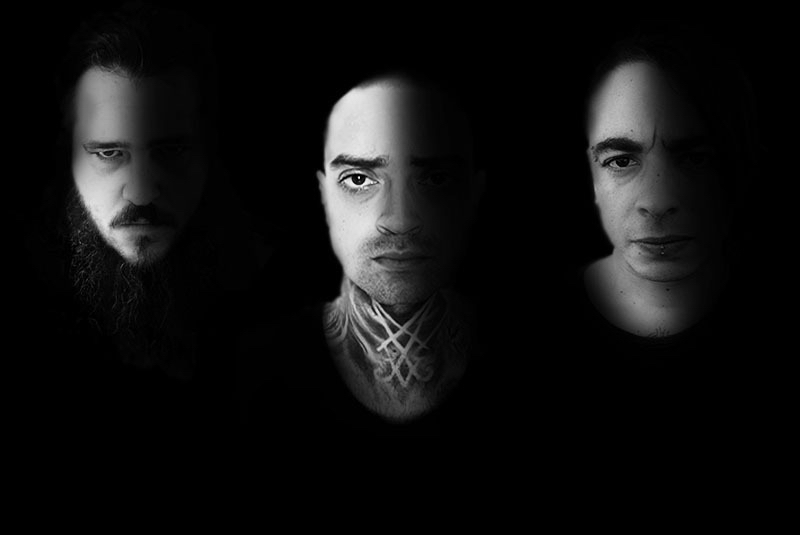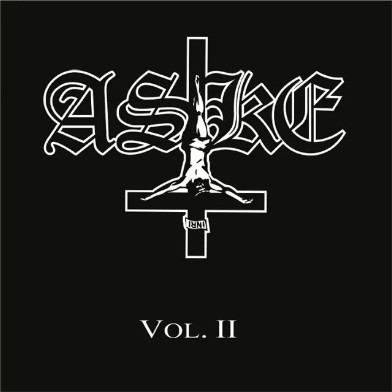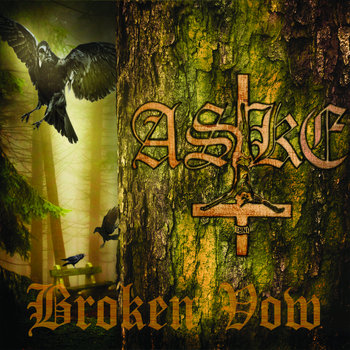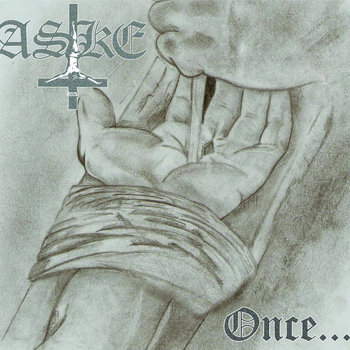Aske - Interview
Formed in 2009 by vocalist and guitarist Filipe Salvini, Brazilian black metal band Aske emerges as a profound expression of its founder's personal experiences and inspirations. With influences dating back to Salvini's childhood, when he began exploring music with a guitar and flute at the age of six, and later dabbling in black metal as a teenager, Aske has become a conduit for the dark and ritualistic creativity that has always fascinated him. The name "Aske", which means "ashes" in Norwegian, was carefully chosen to resonate with the aesthetic and spirit of the genre. Over the years, the band has evolved significantly from the release of their debut album "Once…" in 2015, followed by the EP "Broken Vow" in 2017, to the recent "Vol. II" in 2023. Salvini describes the band's journey as a musical diary, where each new composition is a continuation of previous experiences and reflections. With a sound that balances clarity and heaviness, Aske maintains a unique identity within the black metal scene, combining visual and artistic influences ranging from classic horror films to the spiritual traditions of Quimbanda. This exclusive interview explores the depths of these inspirations, the challenges faced, and the artistic path forged by Salvini and his band.
Marcelo Vieira

How did the idea of forming Aske come about in 2009? What were the main musical influences and how have they shaped the band's sound over the years?
Filipe Salvini: It's important to mention, first of all, that I was born among musician cousins, parents who listened to music and, thinking about it, my friendships at school ended up being made with people who liked music; I got my first guitar and flute when I was 6 years old and reading was present from a very early age too, so the stimulus to write or compose has always surrounded me. Until recently, I kept the notebooks in which I sketched song lyrics in my childhood and early adolescence...
My interest in black metal started when I was in school, I was about 12 or 13 years old and it represented me because it combined music with what was in my head: the cult of the dead, darkness, and the Left Hand Path. I tried playing with one or two extreme metal bands with other kids, but I wanted to write and create original songs and they wanted to play covers for fun on the weekends. So in 2009, right after I left school, I decided to start my own band where I could write songs. I looked up how the word "ashes" would sound in different languages, which would sound best. And Norwegian really sounded the most pleasant, not to mention the happy coincidence that this word was already known in the genre because of other bands. So all I had to do was put an inverted cross behind the writing to show that it was a black metal band.
That was it! I now had my band to write songs for. Simply the desire to express myself through music and channel all the darkness that has constantly inspired me since childhood.
Besides music, what are some of the visual and artistic influences that inspire Aske's work, whether in music videos, live performances, or album art?
It really started in my childhood because the world of the dead and the search for darkness was always something that was constantly on my mind. I had access to Queen, Iron Maiden, and Creedence records. One time I was home alone because my parents had gone out and the movie The Exorcist was on TV. I really liked that style of voice, so listening to black metal for the first time when I was 12 or 13 years old was the perfect marriage because I was hearing that voice that I had liked being applied to music.
Basically, this was the process that occurred since childhood that ended up flowing into black metal – Aske is the melting pot where I was able to work on what was in my head using an aesthetic and artistic framework that best suited me.
Since the release of your first album "Once..." in 2015 to the EP "Broken Vow" in 2017 and now the album "Vol. II" in 2023, how would you describe Aske's sound evolution? What are the main changes you have noticed in your music over time?
The more you practice, the more you dedicate yourself to something you really like, you end up always looking for new paths, new ways of expressing yourself. Maybe it's like writing in a diary where the next page will be a continuation of the previous day: you won't rewrite what you wrote yesterday, but you'll continue where you left off. Therefore, the previous song will always influence the next one and you will have learned from the mistakes and imperfections you made. Since my focus has always been on writing a diary – using the analogy I just created – I believe that improvement and continuity are a consequence.
This applies to the sound evolution, but the reasoning will also apply to the lyrical themes because I will write what I am experiencing at that moment: if I did a ritual that inspired me, Aske becomes a Book of Shadows; if something that day bothered me, I will vent; if I read something relevant, I will paraphrase. It is definitely a diary.
What was the production process like for the album "Vol. II"? Can you share a little about how you managed to achieve this balance between clarity and weight in your music?
Regarding the sound production, the person most responsible for this result is Eugenio Stefane, from 1979 Estúdio. We've been friends for a long time. When I started Aske, he bought his first mixing board with a few channels, and I believe we were his first production or one of the first. Thinking about it now, this definitely makes Aske a diary because you can also see Eugenio's evolution as a music producer. Listening to our songs in chronological order of release is like leafing through his diary. I believe that this perspective answers the balance between clarity and weight in our sound because it is the chapter he is writing at this moment, the result of what he has already written and a foreshadowing of what he will still write.
What is the central message or theme behind the lyrics? Is there a concept or idea that you would like to convey to the listeners through your music? Who is most responsible for this? And tell us a little about this thing of mixing lyrics in English and Portuguese.
Well, I see a musical style as an outfit we wear. Creating a score containing the 7 musical notes is creating an essence that is still devoid of interpretation, from the moment we put it on it becomes visible to everyone's eyes. What I mean by that is that I created something from my point of view and my way of expressing myself, therefore, whoever is with me in Aske is because they identify with this expression and will have their share of contribution when we are composing because they will create arrangements on their instrument that will help write this diary. I like to combine the individual style of the band members and Eugenio, capturing the essence and expression of each one so, in the end, we all become responsible because I bring the individuality and personality of each one to be audible in Aske's music. Regarding the concepts and ideas that I bring to Aske, all of them need to somehow affect or inspire me because that makes the music true and honest, and I believe that this centralization around my perspective is what makes the band have an expressive unity, but that doesn't mean that I'm going to dictate what's done. For example, in this "Vol. II" we close with the song "Pazuzu (Lost into a Valley of Rot)". We needed to compose one last track to close the album, so our guitarist Lucas Duarte asked me to write something about depression. At that moment, I was inspired by the spiritual power that gives the song its name, and I wrote about how Pazuzu has the power to take us out of the darkness of depression if we open ourselves to this primordial world of spirituality. In the song "The Origins of Satan", I was inspired by a book of the same name by the author Elaine Pagels, and "Royalist" is a satire that I wrote about the hypocrisy of society, inspired by the book The Count of Monte Cristo, by Alexandre Dumas. Therefore, I can't easily narrow down Aske's thematic concept because, just like in a diary, I write what inspires me at that moment.
Finally, regarding languages, I like to write in both Portuguese and English. I'm passionate about books and I write everything, from a poem containing love verses for a girlfriend who does me good to a poem that becomes a true treatise on black magic to fit into a song for Aske. The song "Represent Satan" could not be in any other language than our Brazilian Portuguese because I was constantly listening to a composer named João do Vale who wrote in the Northeastern cordel format. So "Represent Satan" is my Cordel literature. The predominance of the open vowels A and E and the fricative consonants S and Z in the song's lyrics is because I wanted to explore the prosody of our language based on how a foreigner hears us. And this starts with the title of the song, where we have a word that uses only the vowel E and another word with the vowel A and the fricative sound of S and Z predominates.
In "A Bruxa e o Cardeal" I am influenced by Italian witchcraft composed by oral traditions, and this led me to a more rural and archaic vocabulary. So there is no rule as to whether Aske will make songs in English or Portuguese because my guide is always the inspiration I am having at that moment, I do not want to limit myself to just one language because each one gives me writing possibilities that the other does not have.
What were the biggest challenges you faced during the process of creating and releasing the album? And what were the biggest achievements or most rewarding moments for the band so far?
For me, the biggest achievement is and always will be the personal satisfaction of finishing a composition that I liked and being ready to start the next composition.
The biggest challenge for me has always been to get a good and focused team together to make the band happen. Whenever I manage to get good people together to make music, with character and focused on following the same purpose, some change happens in the life of one of the members that forces them to leave Aske and then I have to go back to looking for someone. Since I have a clear idea of what I want for the creation of our music, finding good composers and arrangers for their own instrument is always a challenge.
How has the reception of the album "Vol. II" been from the public and the critics? Are you satisfied with the way the work has been received? Do you feel that the band is gaining more recognition inside and outside Brazil?
I must admit that I am the most disconnected person in the world that I know, so I will be very happy to know that our music is pleasing and winning over some audience. I really live in a constant immersion in my inspirations and in my insatiable thirst for composing new music. At the same time, I know that this can bother the band members and the people who work with us because I will always be unaware of something they are waiting for me to deliver.
The music video for the track 'Sinner' is full of symbolism. Can you tell us a little more about the process of creating this music video and how it relates to the song and the concept of the album "Vol. II"?
I should start by saying that this "Vol. II" took 6 years to compose and the album contains 10 tracks, so on average, we composed 1.5 songs per year. Can you imagine how many themes went through my head or inspired me during this period? 10 of them became songs for Aske and are present on the album, in each of the tracks. We could even do an interview where I comment only on the inspirations for each one. There is a lot to be said, so I will limit myself here to commenting only on "Sinner" so as not to bore the reader. "Sinner" is the opening song on the album and took 7 months to complete because I wrote the lyrics during a period I was living at that time. So in the end I managed to present a consistent idea to Lucas Duarte, our guitarist, who promptly created the arrangements. Unlike the theme of the lyrics, the production of this video is directly linked to my involvement with Quimbanda and the spiritual movement I am part of at the moment because the filming location was recommended to me by our priestess, inspired by the visions of Exu and Pombagira: it is an abandoned textile factory in a state of ruins. Our spiritual movement has its greatest strength in the Kingdom of Lira, one of the 7 kingdoms of Quimbanda, and the abandoned places and buildings are the home of what we call the People of Hell, one of the legions of Exu and Pombagira that make up the Kingdom of Lira. Throughout the clip, there are riscado points of 3 Exus (Lucifer, Tiriri and Tranca Ruas) and 3 Pombagiras (Rainha do Cabaré, Dama da Noite and 7 Saias) who said they would like to appear in my clip, so the best way I found to fulfill their request was to insert their respective riscado points. Dama da Noite asked to be the owner of the chorus, so it is the riscado point with a red rose that you can see when the chorus begins.
On the back cover of the album, I inserted the riscado point of Exu Tiriri das Encruzilhadas because he is the Exu Maioral of the previous current that I was part of until 2022, so I wanted to pay homage to him because he was present in my life throughout the years of composing the album.
How do you see the current black metal scene in Brazil and what is Aske's role within this constantly evolving scene?
Maybe my answer is not limited to black metal, but to all bands that make original music.
I see a song like I see a book. Several will pass through our ears, just as several books will pass through our eyes, and we will pay attention to those that contain what we are looking for at that moment. Some bands will gain some prominence and start playing at big festivals, just as some books will gain some prominence and become films, series, etc. For me, the important thing in all of this is that the music, like a book, will serve as inspiration to someone. Just as bands inspired me to play black metal, it would be gratifying to know that I helped keep this flame alive. I don't follow scenes very much, I just stick to bands that inspire me in some way, and this is not limited to the scene or to a musical style.
How does Aske seek to stand out within the Brazilian black metal scene? Is there any particular element or approach that you consider unique to the band?
I believe that the best way for a band to gain prominence is to invest heavily in its compositions and to be self-critical. I believe that if Aske gains any relevance it is because we care about the raw material we offer to the ears and the rest is a consequence of maintaining this focus. Artists who have had this concern transcended their time and even after their bands have ended their music remains relevant. And only time will tell about the music we make in Aske.
What I consider unique about Aske is the purpose for which I created this band: expression. I believe that a band is unique when there is a very well-defined lyrical soul in the reason that band was created, and this is the spectrum that will accompany the band throughout its existence.
What are the next steps for Aske after the release of "Vol. II" and the video clip for 'Sinner'? Do you have plans for more releases or tours in the near future?
I must say that we never stop composing or creating because it is my personal focus, so if tomorrow we needed to release some material, we would have songs ready for that. It is rare that we do not have something already composed or in progress. However, we have a recently released album and a video that can be released and worked on at this moment, so this is our "now", we are rehearsing to go back to playing live and releasing what we have already done. we have launched.
Upcoming Releases
- Morrath - Obscure Abominations - Feb 25
- Chalice - Divine Spear - Feb 27
- Blackwater Drowning - Obscure Sorrows - Feb 27
- Vide - Aux Enfants Des Ruines - Feb 27
- The Leaving - The Leaving - Mar 06
- Serpent Icon - Tombstone Stories - Mar 06
- Insect Inside - Reborn In Blight - Mar 06
- Triumpher - Piercing The Heart Of The World - Mar 06
- Lömsk - Act II - Of Iron And Blood - Mar 06
- God Against Humanity - The Judgement - Mar 06
- Miserere Luminis - Sidera - Mar 06
- Gravemass - This Is The Way - Mar 06
- No/Más - No Peace - Mar 13
- Monstrosity - Screams From Beneath The Surface - Mar 13
- Against I - Anti Life - Mar 13
- Empire Of Disease - While Everything Collapses - Mar 19
- Hanging Garden - Isle Of Bliss - Mar 20
- Putred - Blestemul Din Adânc - Mar 20
- Gaerea - Loss - Mar 20
- Diatribes - Degenerate - Mar 20



